Turkish traditions and culture of Turkey
Turkish traditions and Turkish culture are so rich and multifaceted that does not fit into any simple definition. For thousands of years the Turkish traditions of many peoples of Anatolia, the Mediterranean, the Middle East, the Caucasus, Eastern Europe, Central Asia and of course ancient world merged unique alloy which today we call Turkish or Minor Asia culture. We must add that the Turks themselves before the start of the XX century was not a single nation and brought many unique elements from the depths of Central Asia which blended in the modern life of the country.
Answering the questions "what are the Turkish culture facts" we must admit that the precursor of the modern Republic of Turkey - Ottoman Empire for centuries was as a synonym for religious and cultural intolerance and aggressive foreign policy. But modern Turkey is considered one of the most tolerant countries in Asia where representatives of different nations co-exist peacefully though a few centuries and even decades they were in bitter war with each other. Even the ethnic composition of the population here has never been officially detected - the overwhelming majority of local residents consider themselves Turks first and only then the representatives of a particular ethnic group. Only Kurds stand out (they are called "dogulu" - "the people from the East"), the Circassians (generic name for all people from the Caucasus region - Meskhetian Turks, Abkhazians, Balkar and others), Laz and the Arabs (including Syrians).
Turkish religion and culture
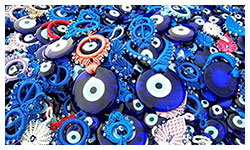
It is known fact that Turkey has been home for three major religions in the world – Judaism, Christianity and Islam. Nowadays most of Turkey’s people are Muslims but this is not an obstacle to the fact that Ecumenical Patriarch of Orthodox Christian Church is located in Constantinople (Istanbul) therefore there is a number of active Orthodox Christian churches in Turkey as well as some Roman Catholic Churches. There is also a Jewish community in Turkey. With all this said it is important to notice that the Turkey's history of religious tolerance is exemplary. Under the Ottoman Empire each religious community was autonomous. Some churches have not been demolished by ottomans but has been transformed to mosques and even now you can Christian paintings on the walls of Aya Sofya mosque/church in Istanbul.
Social division
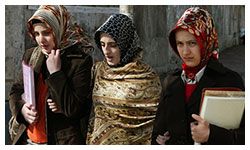
The social stratification of the population in Turkey is considered one of the Turkish traditions. The most important indicators of status are always considered as wealth and education. And if the first is more or less clear - Turks are very different from the other peoples of the region for the views on the role of money in society then the second option is much more interesting. University education for Turkish people is the minimum threshold to access the higher layers of society regardless of their actual wealth. Previously the high layers of society were represented by military and bureaucratic elite of the Ottoman Empire now "the focus of power" has clearly shifted towards successful doctors, businessmen and politicians as well as high-level officials. At the same time the "Westernization" of urban "upper class" is noticeable, the majority of whom speak at least one foreign language, they are familiar with the culture of the world and have close contact with foreign business, cultural and political circles.
But the urban middle class (most government employees, owners of small businesses, skilled workers and students) notably tends to Turkish culture although their level of education is often not lower in comparison to high class. This dualism combined with rapid population growth which is migrating to the cities from the province leads to the formation of a very multi-faceted and mobile society which is the feature of any Turkish city.
Approximately 30% of the population of Turkey is the villagers, farmers and peasants. The development of communication and transportation has led to a gradual blurring of the borders between rural and urban areas and the level of education of rural residents is quite high for Asia (in 1995 the 83% of the province citizens were considered educated). The level of income is low which leads to permanent migration to cities (mostly seasonal). In this case the young villagers simply cannot count on the highest income in the city without further education which defines clearly visible thrust of young Turks to knowledge. Some of the rural areas in the east of Turkey are still under the full control of the large landowners, the heads of the clans and religious leaders.
Most of rich Turks prefer western-style clothes, follow the latest fashions, try to live in their own apartments and have a car, an expensive phone as indispensable attributes of wealth and success. Also the desire for European literature, music, theater and artistic life is clearly visible. And what's interesting - a lot of attention is paid to their language - all segments of the local society tend to speak the Istanbul dialect of Turkish language although many Turkish people are fluent in 2-3 other languages and dialects. At the same time the low-income class of society obviously tends to conservative clothing, Turkish and Middle Eastern music, uses a variety of local dialects and often has difficulty understanding each other. In contrast to many other countries with the same clear division of population on the basis of wealth it practically does not cause any social tensions.
Turkish family traditions, relationships and marriage
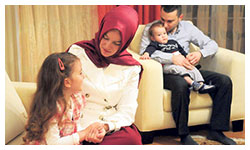
For Turkish traditions and Turkish customs the early age of marriage is very typical. It is considered that a man should not reduce the standard of living of his wife so marriages between members of different social groups are rare. But the unions within one religious or ethnic group are very common although inter-ethnic marriages are not something unusual.
In 1926 the revolutionary government abolished the Turkish Islamic family code and adopted a slightly modified version of the Swiss Civil Code. The new family law recognizes only civil marriage ceremonies, the mandatory consent of both parties, conclusion of contract and monogamy. However in traditional Turkish society the choice of the future spouses and the marriage ceremony scenery is still being conducted by the heads of families only and the newlyweds themselves play a very minor role. In this respect all the rituals are considered as extremely important element as well as the blessing of marriage by imam. As for the Turkish wedding traditions and customs, wedding here lasts for many days and consists of several ceremonies which usually involve all family members and often all residents across the street or even the entire village.
In Islamic tradition the groom must pay the bride price although in recent years this tradition becomes a thing of the past - the amount of "bride price" (kalim) is being reduced depending on the expenses incurred for the wedding or the total family income, or simply transferred to the newlyweds to develop their own family. At the same time in the provincial patriarchal communities the money raise to buy pride can be a serious impediment to the marriage. For more informaton on Turkish wedding ceremony please visit http://www.turkishculture.org/lifestyles/ceremonies-536.htm.
Even though that divorces are not considered a sin their number is small. Divorced, especially men with children (and here it is not uncommon), quickly get remarried usually with the same divorced women. Modern code does not recognize the old norm of the husband's prerogative right of oral and unilateral divorce and prescribes the judicial procedure of this process. And there may be only sixreasons for divorce - adultery, life-threatening, criminal or unethical way of life, an escape from the family, mental infirmity and incompatibility. The apparent vagueness of these requirements is the cause of rare recognition of lawsuits and divorce by mutual consent is not defined by local legislation.
Acoording to the Turkish traditions the family plays a central role in the life of a any Turk. Members of the same clan or family tend to live close to each other and provide a literally daily contact, financial and emotional support. This explains the large and operational support to aging parents and the younger generation as well as the strength of relationships regardless of the residence place of family members. As a result the Turks do not have the problem of abandoned old people and homelessness, relatively problem of youth crime is irrelevant. And even many of the village including those located in remote places are being supported by a relatively high degree of safety - there is always a couple of elderly relatives who are willing to support the "family nest" which often hosts a variety of holiday activities.
The Turks themselves quite clearly distinguish the family (aile) and household (hane) referring to the first category only close relatives living together and to the second - all members of the clan who live together on a territory and keep common household. The next important element is the male community (sulale) which consists of male relatives. These communities play an important role in the life of the old "noble families" carrying out its history from the time of the Ottoman Empire and tribal alliances. They are almost unknown among most citizens even though they have a big impact on the country's politics.
According to Turkish culture facts men and women play much different roles in the family. Usually Turkish family is characterized by a "male domination", respect for elders and women's subordination. The father or the oldest male in the family is the head of the family and his instructions are usually not discussed. However a man carries a very heavy load - he provides the well-being of the family (until recently Turkish women had the right not to work outside the home), represents the family in front of other family members and even responsible for the upbringing of children although. Until the end of the XX century even shopping was purely masculine duty!
The role of women in the Turkish family despite the many myths is rather simple. Formally wife shall respect and completely obey to her husband, do housework and parenting. But the Turks say "honor of the men and their families depends on the way women behave and watch over the house." The woman, being considerably limited by walls own home, often manages all internal affairs of the clan. Mother is being respected by younger family members the same way as the head of the family but her relationship with the children are warm and informal. In Turkish culture women have equal rights to private property and inheritance as well as education and participation in public life and many of them are happy to use them (in 1993-1995 the Prime Minister of Turkey was a woman - Tansu Ciller). Turkish women are considered the most emancipated in the Middle East though still loose in education level to Jordanian or Israeli women but the gap is rapidly shrinking.
However the local women pay tribute to centuries-old traditions - even in the most modern cities in the country the woman's dress is modest and closed, they wear capes which hide the face and body partially or completely and next to a very popular European costume often you can see the traditional folk forms of clothing that Turkish women wear with the famous grace. In the province the women's costume is much more modest and inconspicuous and in general women do not tend to leave the limits of their home even though many of them work on the land, stores or markets and do not try to hide from the sight of others – so traditions in Turkey are. In some rural areas the close is still a "hallmark" of the woman and it determines its origin and social status. The traditional women's headscarves (usually are called as "basortusu" though there are other variants of pronunciation) that partially covers the face are simply banned in government offices and universities but attempts to undo this "innovation Ataturk" are being taken continuously.
Turkish children are literally being adored and indulged in every possible way. Here it is allowed to ask the childless couples when they plan to have children and then literally spend hours discussing this "problem". Even in ordinary conversation between men for example the children will take place no less important than football or market prices. Sons enjoy a special love because they increase the status of the mother in front of her husband and his relatives. Sons younger than 10-12 years spend a lot of time with their mother and then proceed to the "man's circle" and their education gets more dependent on men of the family. Daughters also usually live with their mother until marriage. In general the relationship between fathers and daughters is quite formal and their attachment (often no less than to sons) is rarely shown in public. Although the daughter or son may argue or joke in public with mother they are respectful to father and never dare to argue with him in public.
The relationship between brothers and sisters in Turkey are easy and informal up to 13-14 years. Later their statuses change noticeably - older brother (agabey) takes on some of the rights and responsibilities of parents in relation to her sister. As for the Turkish beliefs and Turkish traditions, the older sister (abla) also becomes in relation to his brother as a second mother - Turks reasonably believe that it is preparing the girls for their future role as wives. In large families the grandparents also take on a lot of the burden of raising children. This often leads to the fact that children feel a sense of permissiveness and sometimes behave very arrogantly but to be honest you me that here no more than anywhere else in the world.
Even very young children everywhere attend restaurants and cafes with their parents at any time of the day. The most places have high chairs, special tables with and menu including dishes for children of all ages. Most hotels have a special play grounds and offer children beds. However in most cases they are suitable to short heighted local children and small for Europeans so it's best to order them in advance according to the required size. The car baby seats are also available at most car rental companies.
Relations
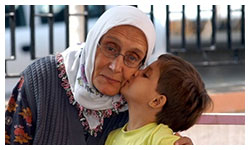
Relations between persons of different generations and genders are determined quite tough by local Turkish etiquette and manners. If they are not close friends or relatives then it is obligation to behave with the elders with respect and courtesy especially in public. Even the relatives of the opposite sex in public usually do not show signs of affection, during the celebrations all are being rapidly distributed to groups depending on age and gender.
As for the Turkish greeting customs, friends or close relatives of the same sex may hold hands or greet each other with kisses on the cheek or give hug – in any other cases it is not allowed. Men shake each other’s hands as Europeans but they never shake woman’s hands if she does not allow this clearly. The last point by the way is associated with numerous incidents with foreign tourists drawing hand first meeting local people for whom it is a clear invitation to become better acquainted.
In the bus, dolmus or theater if there is a choice of places the woman should always sit next to another woman while a man cannot sit next to a strange woman without her permission - it is important rule in Turkish cultrure.
Turkish etiquette and manners
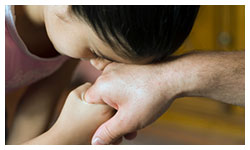
Formal etiquette in Turkish culture has great importance determining the most important forms of social interaction. Local customs in Turkey implies an accurate oral form for about any occasion on appeal to other people and value the correctness of these rituals.
Turkish hospitality (misafirperverlik) remains one of the cornerstones of the Turkish culture and Turkish customs especially in rural areas. Friends, relatives and neighbors often visit each other. An invitation to be guest is usually heralded with elegant set of proposals and it is required to be tactful to refuse without offending the hosts. Such proposals usually do not have any hidden reasons - no expect of any gifts other than good company and interesting conversation. If you did not accept the offer it is recommended to refer to the lack of time and employment - Turks appreciate such arguments. Even short (by local measures) visits unlikely last less than two hours - except compulsory tea or coffee a guest in any case will be offered to have a meal more than once. Do not try to pay the bill if you are invited to a restaurant or bring money as gift visiting a private home - it is considered impolite. But subsequently sent photo or a small gift "on occasion" will be perceived sincerity with a joy.
In local Turkish traditions - to offer guests the very best, regardless of family income. Thus despite the widespread misconception the Turks are very tolerant to ignorance of features of their Turkish culture by guest and are able to easily forgive "small sins". Traditionally the meal takes place at a low table with guests seating on the floor - feet at the same time are hidden under the table. Dishes are being laid out on a large tray that is placed either on this low table or even on the floor and people sit around on cushions or mats and take food from a tray to their plates by hands or shared spoon. In the cities however European type tables are usually widespread as well as the usual serving with individual dishes and tableware.
As elsewhere in the Islamic countries anything from the shared plate should be taken by right hand only. Also it is considered bad tone to talk at the table without the permission of the home owner, to choose special pieces from a shared plate and open mouth wide - even if you want to use a toothpick, you should cover your mouth.
Dining etiquette in Turkey
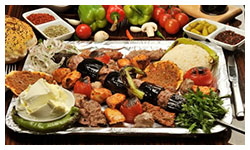
It should be noted that the Turks never eat alone and do not snack on the go. Usually they eat three times a day preferring to do it as a family. Turkish breakfast includes bread, cheese, olives and tea. Lunch time is usually quite late and begins only after all family members gather. The lunch menu usually consists of three or more meals which are eaten in series and each dish is served with lettuce or other greens. It is common to invite guests, neighbors and friends to dinner but in this case the meal and the time is being negotiated in advance. Despite the Islamic prohibitions on alcohol during the dinner dinners are often served with raki (anisette), wine or beer (in most of the country it is not considered as an alcoholic beverage). In this case a must-serve meal is meze - a variety of snacks (fruit, vegetables, fish, cheese, meats, sauces and fresh bread) usually supplied on small plates.Turkish meze usually is followed by the main course which is being chosen taking into account the range of snacks - a kebab is served with vegetable salads, fish or chicken is coming with rice or hummus, for the soup - tortillas with meat, cheese and pickles.
To drink alcohol beverages even beer in public is considered indecent. It is not allowed to sell alcohol in public places of Turkey. And at the same time the alcohol beverages are being sold almost freely in many shops and only in Ramadan shelves with it are closed or blocked.
Pork cannot be found in the local cuisine at all and besides it there are many other products that are not formally prohibited by Islamic standards but avoided for other reasons. For example representatives of tribal group Oruk avoid all seafood except fish, members of the Alevi Order do not eat rabbit, in the central regions of the country people do not eat snails and so on. On the periphery of Turkey there are still clearly visible culinary elements of the people who inhabited this land before the Turks arrived here. Georgian chicken in sacivi sauce, Armenian lahmacun or lagmadzho (similar to pizza) is known as lahmakun and considered a Turkish dish. The same applies to many Arab and Greek dishes (meze for example). At the same time rural residents eat very modest food - a large part of their diet is bread with onions, yogurt, olives, cheese and jerked meat ("pastirma").
Turkish hospitality
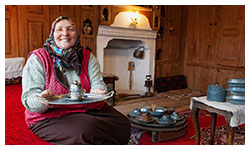
Thought Turkish people are very hospitable stay up late being guest is not accepted. To start a meal or tea without invitation of owner is not recommended, even to smoke a cigarette without the permission of a senior male or organizer of the meeting is considered impolite. As for the business etiquette, business meetings are usually preceded by tea and unrelated to business conversations, go directly to the business discussion is not accepted. But the music and the songs can make the ceremony to last long - the Turks are very musical and love to play music at every opportunity. A British ambassador in XIX century remarked that "the Turks will sing and dance whenever they can afford it". Much has changed in the country since then but the locals still love music.
Turkish houses are clearly divided for the guest and private areas and to ask for a tour around the all house is impolite. Soles of shoes are considered dirty a priori and when entering any private house as well as mosque boots and shoes should be taken off. In public places it is possible to walk in shoes. But in some offices, libraries or private shops a slippers or shoes covers can be offered. In crowded places such as mosques or public organizations shoes can be folded into bags and be taken inside.
Turkish language of gestures

Turks use a complex and varied language of body and gestures often quite unobvious for most foreigners - it is very important feature of Turkish culture. For example a snap of the fingers indicates approval of something (good player, the goods of the highest quality and so on), while a click by tongue contrary to popular opinion is a abrupt denial of something (often a raise of eyebrows is being added to the gesture). Fast head swing from side to side means "I do not understand" while single tilt of head to the side may mean "yes". And since there are many of these schemes and each region of the country may have its own specific set so overusing of gestures familiar to us are not recommended - here they can have a completely different meaning.
Turkish clothes
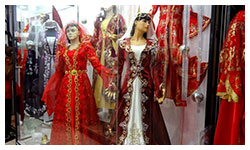
The attitude to clothes in the country of Turkey is rather free and carries notable elements of the Islamic tradition. Business suit, jacket and tie for men are common in the business world and in many cases during celebrations and national holidays Turks prefer it to the national dress. But the women approach the subject more creative - in the everyday life the national costume is still holding it’s positions especially in the provinces and for the feast Turkish women prefer their colorful and very convenient to local conditions dress supplemented it with different accessories.
Tourists visiting Turkey do not have to take special care of the dress - you can wear almost anything that is suitable to the local hot and dry climate. However when visiting places for worship and provincial areas it is better to dress up modestly - shorts, short skirts and open dresses will cause a sharp rejection almost everywhere outside of beach areas.
When visiting mosques and temples women should choose such clothes that can cover their legs and body up to the head and wrists, they should not wear mini-skirts or pants. Men are urged to avoid the short. Women are allowed to enter the territory of all temples only with their heads covered (at the entrance you can rent a headscarf and long skirt). Shoes when visiting the mosque should be left at the entrance. It is better not to go to the mosque during prayers.
During the holy month of Ramadan believers do not eat, drink or smoke from sunrise to sunset. In the evening shops and restaurants are open till late but it is better to refrain from smoking and eating in front of those who keep fasting. End of Ramadan (Ramadan Bayram) is being noisy and colorfully celebrated for three days so all the seats in restaurants as well as travel tickets and tickets for various performances must be booked in advance.













